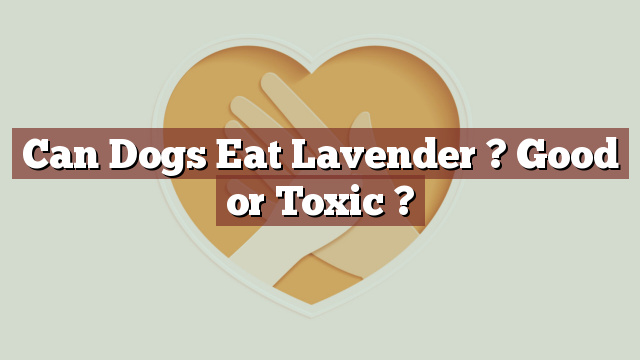Can Dogs Eat Lavender? Is it Safe or Toxic?
It is important for pet owners to be aware of what foods are safe for their furry friends to consume. Lavender, known for its fragrant aroma and therapeutic properties, is a commonly used herb. However, can dogs eat lavender? Is it safe or toxic for them? Let’s delve into the matter and find out.
Nutritional Value of Lavender for Dogs
Lavender is not typically consumed for its nutritional value. While it is rich in certain vitamins and minerals such as vitamin A, calcium, and iron, these nutrients are usually present in very small quantities. Therefore, the nutritional contribution of lavender to a dog’s diet is minimal.
Can Dogs Eat Lavender? Is it Safe or Toxic?
No, dogs should not eat lavender. Although lavender is generally recognized as safe for humans, it can be toxic to dogs due to the presence of certain compounds. Lavender contains essential oils, such as linalool and linalyl acetate, which can cause digestive issues and irritation in dogs when ingested in large amounts.
According to scientific research and veterinary insights, the ingestion of lavender can lead to symptoms like vomiting, diarrhea, loss of appetite, and even depression in dogs. Some dogs may also experience allergic reactions to lavender, resulting in skin irritation, itching, or breathing difficulties. Therefore, it is best to avoid giving lavender to dogs as a food item.
Potential Risks and Benefits of Lavender for Dogs
While lavender may have certain benefits for humans, such as promoting relaxation and reducing anxiety, these effects have not been extensively studied in dogs. It is essential to recognize that dogs have different physiological systems and metabolisms compared to humans. Consequently, the potential benefits of lavender for humans may not necessarily translate to dogs.
On the other hand, the risks associated with lavender consumption in dogs are well-documented. The aforementioned symptoms of digestive issues, allergic reactions, and depression can significantly impact a dog’s health and well-being. Therefore, the potential risks of feeding lavender to dogs outweigh any perceived benefits it may offer.
What to Do if Your Dog Eats Lavender
If you suspect that your dog has ingested lavender, it is crucial to monitor their behavior and health closely. Should any concerning symptoms occur, such as vomiting, diarrhea, or breathing difficulties, it is recommended to seek immediate veterinary attention. The veterinarian will be able to provide appropriate guidance and treatment based on the specific circumstances.
Conclusion: Considerations for Feeding Lavender to Dogs
In conclusion, dogs should not eat lavender as it can be toxic and potentially harmful to their health. While lavender may have certain benefits for humans, it is not suitable for canine consumption. Pet owners should prioritize the well-being of their dogs by ensuring they are fed a balanced and appropriate diet. If you have any concerns or questions regarding your dog’s diet, it is always best to consult with a veterinarian who can provide professional advice tailored to your pet’s specific needs.
Thank you for investing your time in exploring [page_title] on Can-Eat.org. Our goal is to provide readers like you with thorough and reliable information about various dietary topics. Each article, including [page_title], stems from diligent research and a passion for understanding the nuances of our food choices. We believe that knowledge is a vital step towards making informed and healthy decisions. However, while "[page_title]" sheds light on its specific topic, it's crucial to remember that everyone's body reacts differently to foods and dietary changes. What might be beneficial for one person could have different effects on another. Before you consider integrating suggestions or insights from "[page_title]" into your diet, it's always wise to consult with a nutritionist or healthcare professional. Their specialized knowledge ensures that you're making choices best suited to your individual health needs. As you navigate [page_title], be mindful of potential allergies, intolerances, or unique dietary requirements you may have. No singular article can capture the vast diversity of human health, and individualized guidance is invaluable. The content provided in [page_title] serves as a general guide. It is not, by any means, a substitute for personalized medical or nutritional advice. Your health should always be the top priority, and professional guidance is the best path forward. In your journey towards a balanced and nutritious lifestyle, we hope that [page_title] serves as a helpful stepping stone. Remember, informed decisions lead to healthier outcomes. Thank you for trusting Can-Eat.org. Continue exploring, learning, and prioritizing your health. Cheers to a well-informed and healthier future!

